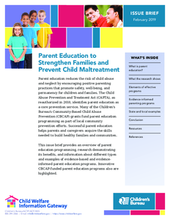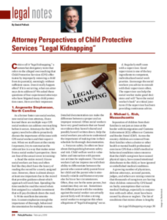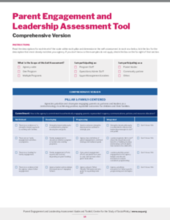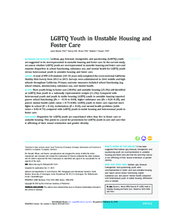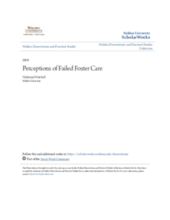Displaying 1061 - 1070 of 2221
This issue brief provides an overview of parent education programming, research demonstrating its benefits, and information about different types and examples of evidence-based and evidence-informed parent education programs.
For this legal note, four experienced attorneys who have litigated many child protection cases were asked about the alleged overreaching that US Child Protective Services (CPS) effectuates by improperly removing a child from its parent(s), seemingly without sufficient cause.
This resource is designed to help agencies, systems, and collaboratives working with young children and their families to chart a course toward an expanded approach to family engagement.
This study assesses whether LGBTQ youth are overrepresented in unstable housing and foster care and examines disparities in school functioning, substance use, and mental health for LGBTQ youth versus heterosexual youth in unstable housing and foster care.
The purpose of this action research study was to investigate social workers’ perceptions of the problems that prevent successful family reunifications after foster care. The study explored social workers’ perceptions of barriers that prevent family reunifications in central Mississippi, USA.
The Call for Abstracts for the 2019 US National Child Welfare Evaluation Summit is broad and inclusive. Any proposal that substantively contributes to one or more of the three primary goals—building evidence, strengthening practice, and informing policy—will be considered.
This study examined the effect of privatization policy on the issue of racial disparity in the child welfare system.
In this exploratory study, through use of an online anonymous survey, local county child welfare caseworkers were asked to self-rate their knowledge of, exposure to, and comfort levels with children with developmental disabilities.
This report turns the lens on young people who age out of foster care and explores four areas — education, early parenthood, homelessness and incarceration — where they fare worse than their general population peers in the US.
The aim of this study was to estimate the prevalence of Child Protective Services (CPS) reports during early childhood and substantiated investigations during childhood for children living in different types of neighborhoods.

